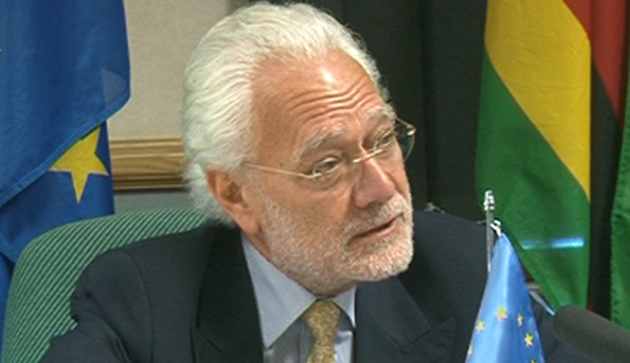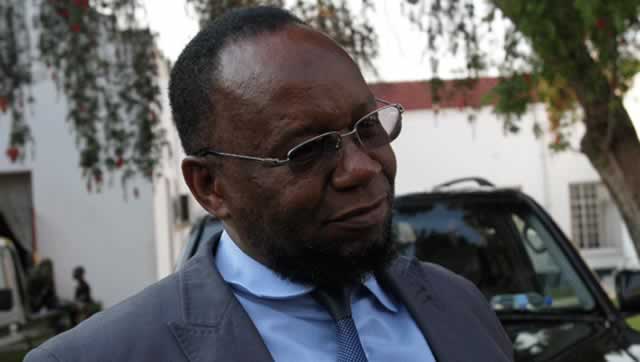NGOs: When the tail no longer wags the dog

Tichaona Zindoga Senior Political Writer
statements this week by the EU Ambassador to Zimbabwe, Aldo Dell’Ariccia, regarding the moribund and increasingly irrelevant political actors parading as civil society organisations in Zimbabwe were bound to hurt.
And they hurt — hurt very much — given the grief that has befallen the various parsonages associated with civic society.
A brief historical context: hundreds of civic society organisations were formed circa 2000 ostensibly to fight for civil and human rights and democracy in the country.
They were sponsored by American and other Western governments directly or through proxies to not only act as appendages to the opposition MDC but also to provide a false “independent” voice of the populace.
Together with sanctions, the civic society and opposition were meant to achieve regime change of the revolutionary Zanu-PF and President Mugabe.
The politics and, ultimately fortunes, of the civic society organisations and opposition were intricately linked.
In light of the cruel fortunes that have afflicted the opposition, namely losing the elections last year and the implosion of the MDC-T, the West is rethinking, or at least appears to be disinterested in both the opposition and its civil society appendages.
This is for likely reasons.
One, the high noon of politics has just slipped past and secondly, it may not hurt the West, particularly the EU, to see Zimbabwe in a more receptive manner, especially when the latter is showing signs of relenting on key issues such as the indigenisation policy.
(Many may have observed how lately the hard-working Dell’Ariccia is prodding and prodding and prodding on the indigenisation and investment issue. The more imaginative may think of sharks that may have smelled blood.)
So, most probably out of pragmatism, the EU is changing tact and engaging Zimbabwe. It has also lifted most of its sanctions against the country. The EU is seeking no confrontations and thus will not worry about engagements and partners that do not serve its new purpose.
Hence, Dell’Ariccia told the NGOs that they were “living anchored in the past” and failed to “catch the flare of the moment”.
To drive home his new-found disdain for the NGOs, he accused them of behaving like “charity organisations”.
This was guaranteed to unsettle civic society activists, most of whom had enjoyed full-time employment as regime change agents and were always flush with cash, some of which they never accounted for.
The setting of his statements, at one organisation called Crisis Coalition in Zimbabwe, was even ironic for someone to declare that there was no leadership crisis in the country.
Here are some of the rumblings as reported in the media: Zimbabwe Social Democrats Secretary General Wilbert Mukori was quoted as saying Dell’Ariccia’s comments were “tragic”.
Charles Mangongera imperilled the envoy saying, “ . . . as ambassadors and as analysts we tend to speak from the comfort of air-conditioned hotels without understanding the situation.”
Mangongera was quoted as adding: “To castigate the civil society and say they shouldn’t do this or that I don’t think that is the responsibility of an ambassador . . . ”
Takura Zhangazha, one of the eminent civic society players, writing on his blog, accused the ambassador of “diplomatic opportunism”, being “conveniently pragmatic”.
The writer speculates that Dell’Ariccia intends to redefine Zimbabwean civic society.
And strongly: “To make such broad but shallow statements as Mr Dell’Ariccia did, together with the sectional applause he got from those that would have previously been most shrill in opposing his every word, is the stuff of diplomatic opportunism. It is unfortunate that in his case, it would appear to be patently dishonest.”
To say that the tail no longer wags the dog in this instance where the civic society no longer controls western capitals as they previously did through false, concocted and manipulative reports on Zimbabwe, is more than a mere Dundrearism.
The tables have surely turned and it is so tragic for the local activists.
Yet they should have seen it coming.
The political environment in the country has changed drastically from what it was 10 years ago where sanctions-inspired economic hardships of shortages were a new phenomenon.
After years of suffering the same, and given the clemency of the weather in sparing droughts, the mood of the country was different in 2013. Years of suffering and job losses had significantly hardened Zimbabwean people into resourcefulness and industriousness.
Besides, political awareness crept back to the people, especially after seeing through the poor performance and fallibility of the opposition MDC while it was in government. These dynamics lend the necessity of a paradigm shift in the civic society.
Ambassador Dell’Ariccia offers handy advice that the NGOs must “catch the flare” because “there is an opening” in the form of engagement.
Trevor Maisiri, one of the more prominent civic society actors locally and regionally, could be said to be way ahead of his ilk that are whining today.
After last year’s elections, outlining the role and opportunities of the civic society post-election, he called for depoliticisation of the civic society as well as engagement with “domestic institutions”.
“Engagement, in the civil society sense, and given Zimbabwe’s political context, establishes civil society to represent citizens in the community and broader national issues that have amply been dominated by the politics in the past. Engagement creates a voice for those majority citizens, who have otherwise been voiceless, outside of political party domains.
“In the past many civil society organisations have not prioritised engagement with key domestic institutions such as parliament, government ministries, local government authorities, government departments, independent commissions and others. Some of the disengagement or lack of upfront interest by civil society has been due to these institutions’ reluctance to engage with civil society. This can only be addressed if civil society emerges as intently refocused on occupying non-political party space and mandated from the citizenry base.”
Civil society activists in Zimbabwe will have to heed such counsel given the circumstances they are in.
Besides, the very essence of the civil society is to represent the voice of the citizenry and be independent of the politicians.
In which case, those who seek to be members of the political society must declare their interests and be seen in the arena where politicians play.








Comments